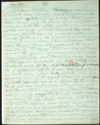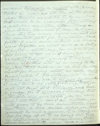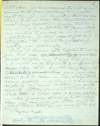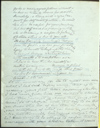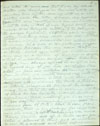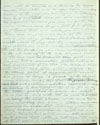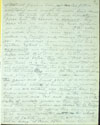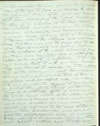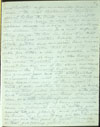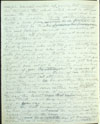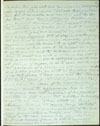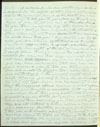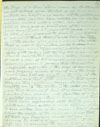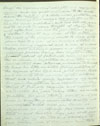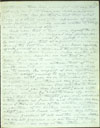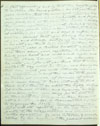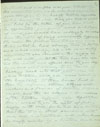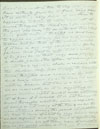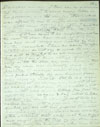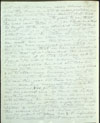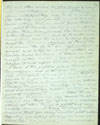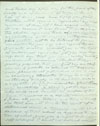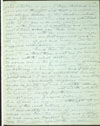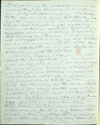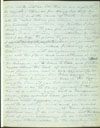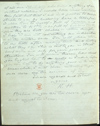Mahatma Letter No. 74
| Quick Facts | |
|---|---|
| People involved | |
| Written by: | Koot Hoomi |
| Received by: | A. P. Sinnett |
| Sent via: | unknown |
| Dates | |
| Written on: | unknown |
| Received on: | August 1882 |
| Other dates: | unknown |
| Places | |
| Sent from: | unknown |
| Received at: | Simla, India |
| Via: | unknown |
This is Letter No. 74 in The Mahatma Letters to A. P. Sinnett, 4th chronological edition. It corresponds to Letter No. 30 in Barker numbering. See below for Context and background.
< Prev letter chrono
Next letter chrono >
< Prev letter Barker
Next letter Barker >
Page 1 transcription, image, and notes
|
Private. My dear Brother. Perhaps, a week ago, I would have hardly failed to embrace this available opportunity and say that your letter concerning Mr. Fern is as complete a misrepresentation of the spirit, and above all, of the attitude of M. towards the said young gentleman, as your complete ignorance of the aim he is pursuing could produce — and I would have said no more. But now, things have changed; and though you have "come to know that we" did not really possess the power of reading minds as had been pretended, nevertheless, we know enough of the spirit in which my last letters were received, and of the dissatisfaction produced, — to suspect, if not to know that unwelcome as truth may often come, yet the time has arrived for me to speak frankly and openly with you. Lying is a refuge to the weak, and we are sufficiently strong, even with all the shortcomings you are pleased to discover in us, to dread truth very little; nor are we likely to lie, only because it is to our interest to appear wise concerning matters of which we are ignorant. Thus, perchance it might have been more prudent to remark that you knew that we did not really possess the power of reading minds, unless we brought |
NOTES: |
Page 2
|
ourselves thoroughly en rapport with, and concentrated an undivided attention on, the person whose thoughts we wanted to know — since that would be an undeniable fact, instead of a gratuitous assumption as it now stands in your letter. However it may be, I now find but two ways before us, with not the smallest path for compromise. Henceforth, if your desire is that we should work together, we must do so on a footing of perfect understanding. You will be at perfect liberty to tell us — since you seem, or rather have brought yourself to sincerely believe it — that most of us, owing to the mystery that enshrouds us, live by getting credit for knowing what we really do not know; while I, for instance, will be as entitled as you are, to let you know what I may think of you, yourself meanwhile promising, that you will not laugh at it outwardly, and bear a grudge for it inwardly (something that notwithstanding your efforts you can rarely help) but that, in case I am mistaken you will prove it by some demonstration weightier than a mere denial. Unless you bind yourself by such a promise, it is utterly useless for any of us to be losing our time in controversies and correspondences. Better shake hands astrally, across space, and wait |
NOTES:
|
Page 3
|
until either you have acquired the gift of discerning truth from falsehood to a greater degree than you now have it; or, that we are shown to be no better than impostors (or still worse — lying spooks); or finally, that some one of us is in a position to demonstrate our existence to yourself or Mr. Sinnett — not astrally, for that might only strengthen the "Spirit" theory but — by visiting you personally. Since it becomes quite hopeless to convince you that even we occasionally, do read other people's thoughts, may I hope that you will credit us, at least, with a sufficient knowledge of the English language not to have entirely misunderstood your very plain letter? And, to believe me, when I say, that having perfectly understood it, I answer you as plainly "as My dearest Brother, you are egregiously mistaken from first to last!" Your whole letter is based upon a misconception, an entire ignorance of "missing links," which alone may have given you a true key to the whole situation. What can you mean by the following?
|
|
NOTES: |
Page 4
It is unnecessary for me to repeat once more what I have said before; namely, that up to receiving your first letter concerning Mr. Fern, I had never given him one moment's attention. Who then, amongst us — spoils that young gentleman? Is it Morya? Well, it is easy to see, that you know still less of him, than he knows, in your conceptions, of what you have in your mind. "He has thoroughly humbugged Morya." Has he? I am sorry to be obliged to confess that, in accordance with your Western code it would |
NOTES: |
Page 5
|
look rather the reverse; that it was my beloved Brother who "humbugged" Mr. Fern — had not the ill-sounding term another meaning with us, as also another name. The latter of course, may appear to you still more "revolting," since even Mr. Sinnett, who is but the echo in that of every English Society man, regards it as thoroughly revolting to the feelings of the average Englishman. That other name is — PROBATION; something every chela who does not want to remain simply ornamental, has nolens volens to undergo for a more or less prolonged period; something that — for this very reason that it is undoubtedly based upon what you Westerns would ever view as a system of humbug or deception — that I, who knew European ideas better than Morya, have always refused to accept or even to regard any of you two as — chelas. Thus, what you have now mistaken for "humbug" as coming from Mr. Fern, you would have charged M. with it, had you only known a little more than you do of our policy; whereas the truth is, that one is utterly irresponsible for much he is now doing, and that the other is carrying out that of which he has honestly warned Mr. Fern beforehand; that, which, — if you have read, as you say, the correspondence — you must have learned from H.P.B.'s letter to Fern from Madras, that in her jealousy for M.'s favours, she wrote to him to Simla, hoping she would thereby frighten him off. A chela under probation is allowed to think and do whatever he likes. He is warned and told beforehand: |
NOTES:
|
Page 6
|
you will be tempted and deceived by appearances; two paths will be open before you, both leading to the goal you are trying to attain; one easy, and that will lead you more rapidly to the fulfilment of orders you may receive; the other — more arduous, more long; a path full of stones and thorns that will make you stumble more than once on your way; and, at the end of which you may, perhaps, find failure after all and be unable to carry out the orders given for some particular small work, — but, whereas the latter will cause the hardships you have undergone on it to be all carried to the side of your credit in the long run, the former, the easy path, can offer you but a momentary gratification, an easy fulfilment of the task. The chela is at perfect liberty, and often quite justified from the standpoint of appearances — to suspect his Guru of being "a fraud" as the elegant word stands. More than that: the greater, the sincerer his indignation — whether expressed in words or boiling in his heart — the more fit he is, the better qualified to become an adept. He is free to, and will not be held to account for using the most abusive words and expressions regarding his guru's actions and orders, provided he comes out victorious from the fiery ordeal; provided he resists all and every temptation; rejects every allurement, and proves that nothing, not even the promise of that which he holds dearer than life, |
NOTES: |
Page 7
|
of that most precious boon, his future adeptship — is unable to make him deviate from the path of truth and honesty, or force him to become a deceiver. My dear Sir, we will hardly ever agree in our ideas of things, and even of the value of words. You have once upon a time called us Jesuits; and, viewing things as you do, perhaps, you were right to a certain extent in so regarding us, since apparently our systems of training do not differ much. But it is only externally. As I once said before, they know that what they teach is a lie; and we know that what we impart is truth, the only truth and nothing but the truth. They work for the greater power and glory (!) of their order; we — for the power and final glory of individuals, of isolated units, of humanity in general, and we are content, nay forced — to leave our Order and its chiefs entirely in the shade. They work, and toil, and deceive, for the sake of worldly power in this life; we work and toil, and allow our chelas to be temporarily deceived, to afford them means never to be deceived hereafter, and to see the whole evil of falsity and untruth, not alone in this but in many of their after lives. They — the |
NOTES:
|
Page 8
|
Jesuits sacrifice the inner principle, the Spiritual brain of the ego, to feed and develop the better the physical brain of the personal evanescent man, sacrificing the whole humanity to offer it as a holocaust to their Society — the insatiable monster feeding on the brain and marrow of humanity, and developing an incurable cancer on every spot of healthy flesh it touches. We — the criticized and misunderstood Brothers — we seek to bring men to sacrifice their personality — a passing flash — for the welfare of the whole humanity, hence for their own immortal Egos, a part of the latter, as humanity is a fraction of the integral whole, that it will one day become. They are trained to deceive; we — to undeceive; they do the scavenger's work themselves — barring a few poor sincere tools of theirs — con amore, and for selfish ends; we — leave it to our menials — the dugpas at our service, by giving them carte blanche for the time being, and with the sole object of drawing out the whole inner nature of the chela, most of the nooks and corners of which, would remain dark and concealed for ever, were not an opportunity afforded to test each of these corners in turn. Whether the chela wins or loses the prize — depends solely of himself. Only, you have to remember that our Eastern ideas about "motives" and "truthfulness" |
NOTES:
|
Page 9
|
and "honesty" differ considerably from your ideas in the West. Both we believe that it is moral to tell the truth and immoral to lie; but here every analogy stops and our notions diverge in a very remarkable degree. For instance it would be a most difficult thing for you to tell me, how it is that your civilized Western Society, Church and State, politics and commerce have ever come to assume a virtue that it is quite impossible for either a man of education, a statesman, a trader, or anyone else living in the world — to practice in an unrestricted sense? Can any one of the above mentioned classes — the flower of England's chivalry, her proudest peers and most distinguished commoners, her most virtuous and truth speaking ladies — can any of them speak the truth, I ask, whether at home, or in Society, during their public functions or in the family circle? What would you think of a gentleman, or a lady, whose affable politeness of manner and suavity of language would cover no falsehood; who, in meeting you would tell you plainly and abruptly what he thinks of you, or of anyone else? And where can you find that pearl of honest tradesmen or that god-fearing patriot, or politician, or a |
NOTES: |
Page 10
|
simple casual visitor of yours, but conceals his thoughts the whole while, and is obliged under the penalty of being regarded as a brute, a madman — to lie deliberately, and with a bold face, no sooner he is forced to tell you what he thinks of you; unless for a wonder his real feelings demand no concealment? All is lie, all falsehood, around and in us, my brother; and that is why you seemed so surprised, if not affected, whenever you find a person, who will tell you bluntly truth to your face; and also why it seems impossible for you to realize that a man may have no ill feelings against you, nay even like and respect you for some things, and yet tell you to your face what he honestly and sincerely thinks of you. In noticing M's opinion of yourself expressed in some of his letters — (you must not feel altogether so sure that because they are in his handwriting, they are written by him, though of course every word is sanctioned by him to serve certain ends) — you say he has "a peculiar mode of expressing himself to say the least." Now, that "way" is simply the bare truth, which he is ready to write to yourself, or even say and repeat to your face, without the least concealment or change — (unless he has purposely allowed the expressions to be exaggerated for the same purposes as mentioned above); and he is — of all the men I know just the one to do it without the least hesitation! |
NOTES: |
Page 11
|
And for this, you call him "an imperious sort of chap very angry if he is opposed," but add, that you "bear him for it no malice, and like him none the less for that." Now THIS IS NOT SO, my brother, and YOU KNOW IT. However, I am prepared to concede the definition in a limited sense, and to admit and repeat with you (and himself at my elbow) that he is a very imperious sort of chap, and certainly very apt sometimes to become angry, especially if he is opposed in what he knows to be right. Would you think more of him, were he to conceal his anger; to lie to himself and the outsiders, and so permit them to credit him with a virtue he has not? If it is a meritorious act to extirpate with the roots all feelings of anger, so as to never feel the slightest paroxysm of a passion we all consider sinful, it is a still greater sin with us to pretend that it is so extirpated. Please read over the "Elixir of Life" No. 2 (April, p. 169 col. 1, paras. 2, 3, 4, 5, and 6). And yet in the ideas of the West, everything is brought down to appearances even in religion. A confessor does not inquire of his penitent whether he felt anger, but whether he has shown anger to anyone. "Thou shalt in lying, stealing, killing, etc. avoid being detected" — seems to be the chief commandment of the Lord gods of civilization — Society and Public opinion. That is the sole reason why you, who belong to it, will hardly if ever be able to appreciate such characters as Morya's: a man as stern |
NOTES:
|
Page 12
|
for himself, as severe for his own shortcomings, as he is indulgent for the defects of other people, not in words but in the innermost feelings of his heart; for, while ever ready to tell you to your face anything he may think of you, he yet was ever a stauncher friend to you than myself, who may often hesitate to hurt anyone's feelings, even in speaking the strictest truth. Thus, were M. one to ever descend to an explanation he could have told you: "My Brother, in my opinion you are intensely egotistical and haughty. In your appreciation and self-adulation you generally lose sight of the rest of mankind, and I verily believe that you regard the whole universe created for man, and that man — yourself. If I cannot bear to be opposed when I know I am right, you can bear contradiction still less, even when your conscience plainly tells you that you are wrong. You are unable to forget — though I admit that you are one to forgive — the smallest slight. And, sincerely believing yourself to have been so slighted, by me (sat upon — as you once expressed it) to this day the supposed offence exercises a silent influence over all your thoughts in connection with my humble individual. And though your great intellect will ever prevent any vindictive feelings from asserting themselves and thus over-ruling your better nature, yet they are not without a certain influence even over your reasoning faculties, since you find pleasure (though you will hardly admit it to yourself) — in devising means to catch me tripping to the length of representing me in your imagination a fool, a credulous ignoramus capable of falling into |
NOTES: |
Page 13
|
the traps of a — Fern! Let us reason, my Brother. Let us put entirely aside the fact of my being an initiate, an adept — and reason out the position your imaginative faculties have created for me, like two common mortals with a certain dose of common sense in mine, and a great dose of the same in your head. If you are prepared to concede me even so little, I am prepared to prove to you that it is absurd to think that I could have been taken in in the meshes of so poor a scheme! You write that in order to test me, Fern wanted to know "if Morya wished it (his vision) published — and Morya replies quite falling into the trap that he did wish it." Now, to credit the last assertion is rather hard; and it needs a man of but moderate good sense and reasoning powers to perceive that there are two insuperable difficulties in the way of reconciling your foregoing opinion of myself and the belief that I was actually caught in the trap. 1st: The substance and text of the vision. In that vision there are three mysterious beings — the "guru" — the "Mighty one" and the "Father"; — the latter one being your humble servant. Now it is hard to believe — unless I am credited with faculties of a hallucinated medium — that I, knowing well that I had never approached, until then, the young gentleman from within a mile's distance, nor had I ever visited him in his dreams — that I should believe the reality of the vision described, or that, at least, my suspicions should not have been aroused by such a strange assertion. 2nd. The difficulty of reconciling the double fact of my |
NOTES: |
Page 14
|
being "an imperious chap" who gets very angry when opposed, and, my quiet submission to the disobedience, the rebellion of a chela under probation, who upon learning that "Morya did wish it — i.e. to have his vision published — and had actually promised to rewrite it, never thought of obeying the wish after that, nor had the poor fatuous guru and "Father" thought any more of the matter. Now the whole of the foregoing would be made quite plain even to a man of an average intellect. The reverse having happened, and a man of undoubtedly great intellectual and still greater reasoning powers, having been caught in the poorest cobweb of falsehoods ever imagined — the conclusion is imperative and no other can be formed: that man allowed, unknown to himself, to have his little vindictive feeling gratified at the expense of his logic and good sense. Buss, and we will talk no more of it. With all that, and while openly expressing my dislike for your haughtiness and selfishness in many things, I frankly recognise and express my admiration for your many other admirable qualities, for your sterling merits, and good sense in everything unconnected directly with yourself, — in which cases you become as imperious as myself, only far more impatient — and heartily hope you will pardon me for my blunt — and according to your western code of manners — rude talk. |
NOTES: |
Page 15
|
At the same time, like yourself, I will say, that not only do I not bear you malice, and like you none the less for that — but that what I say is a strict reality, the expression of my genuine feelings, not merely words written to satisfy a sense of assumed duty." And now, that I have made myself the spokesman unto you for Morya, I may, perhaps [be] permitted to say a few words for myself. I will begin by reminding you, that at different times, especially during the last two months, you have repeatedly offered yourself as a chela, and the first duty of one is to hear without anger or malice anything the guru may say. How can we ever teach or you learn if we have to maintain an attitude utterly foreign to us and our methods: — that of two Society men? If you really want to be a chela i.e. to become the recipient of our mysteries, you have to adapt yourself to our ways, not we to yours. Until you do so, it is useless for you to expect any more than we can give under ordinary circumstances. You wanted to teach Morya, and you may find out, (and will if I am allowed by M. to have my own way) that he has taught you one [thing], which will either make us friends and brothers for ever, or, — if there is more of the Western gentleman in you, than of the Eastern chela and future adept you will break with us in disgust and perhaps proclaim it all over the world. For this we are all prepared and are trying to hurry on the crisis one way or the other. November |
NOTES:
|
Page 16
|
is fast approaching and by that time everything has to be settled. The second question: do not you think good Brother, that the uncivilized, imperious chap who would tell you his mind, honestly and for your own good, and, at the same time would be carefully though unseen — protecting yourself, family and reputation from any possible harm — aye, brother, to the length of watching for nights and days a ruffian Mussulman menial bent upon having his revenge of you and actually destroying his evil plans — do not you think him worth ten times his weight in gold, [than] a British Resident, a gentleman, who tears down your reputation to shreds behind your back and will smile upon and heartily shake hands with you whenever he meets you? Do not you think that it is far nobler to say what one thinks, and having said - that even which you will naturally regard as an impertinence — and then render to the person so treated all manner of services of which he is never likely to hear not only [? nor] to find them out — than to do what the highly civilized Colonel or General Watson and especially his lady have done, when upon seeing for the first time in their lives the two strangers in their house — Olcott and a native judge in Baroda — took a pretext to disparage the Society — because you were in it! I will not repeat to you the lies they were guilty of, the exaggerations and slanders directed against you by Mrs. Watson, and corroborated by her husband — the gallant soldier, |
NOTES:
|
Page 17
|
so struck and unruffled was poor Olcott, by the unexpected attack — he who feels so proud of your belonging to the Society that he appealed in his dismay to M. Had you heard what was told by the latter of you, how much he appreciated your present work and frame of mind you would have willingly conceded him the right of being occasionally apparently rude. He forbade him telling any more than what he had already told to H.P.B. and which — woman-like — she immediately imparted to Mr. Sinnett — though angry as she was with you at the time even she resented the insult and offence done to you deeply — and went actually to the trouble of looking back into that past when as Mrs. Watson said you were receiving the hospitality at their house. Such is then, the difference between alleged well wishers and friends of Western superior origin, and the as alleged-ill-wishers of the Eastern inferior race. Apart from this I concede to you the right of feeling angry with M.; for he has done something that though it is in strict accordance with our rules and methods, will, when known be deeply resented by a Western mind, and, |
NOTES: |
Page 18
|
had I known it in time to stop it, I would have certainly prevented it from being done. It is certainly very kind of Mr. Fern to express his intention "to catch" us — "not of course to expose the Old Lady," for what has the poor "Old Lady" to do with all this? But he is quite welcome to catch us and even to expose us, not only for his and your protection but for that of the whole world if it can in any way console him for his failure. And fail he will, that's certain, if he goes on in that way playing a double game. The option of receiving him or not as a regular chela — remains with the Chohan. M. has simply to have him tested, tempted and examined by all and every means, so as to have his real nature drawn out. This is a rule with us as inexorable as it is disgusting in your Western sight, and I could not prevent it even if I would. It is not enough to know thoroughly what the chela is capable of doing or not doing at the time and under the circumstances during the period of probation. We have to know of what he may become capable under different and every kind of opportunities. Our precautions are all taken. None of our Upasika or Yu-posah, neither H.P.B. nor O., nor even |
NOTES: |
Page 19
|
Damodar, nor any of them can be incriminated. He is welcome to show every letter in his possession, and to divulge that, which was offered to him to do, (the choice between the two paths being left at his option) and that which he has actually done, or rather not done. When the time comes — if it ever comes to his misfortune — we have the means to show how much of it is true, and how much wrong and invented by him. In the meanwhile, I have an advice to offer. Watch and do not say a word. He was, is, and will be tempted to do all manner of wrong things. As I say, I knew nothing of what was going on till the other day; when learning that even my name was indirectly mixed in the probation, I warned whom I had to warn, and forbid strictly my own business being mixed up with it. Yet, he is a magnificent subject for clairvoyance, and not at all as bad as you think him. He is conceited — but who is not? Who of us is entirely free from this defect. He may imagine and say what he likes, but that you should allow yourself to be so carried away with a prejudice the existence of which you are not even prepared to admit, is surpassingly strange! You sincerely crediting the statement that M. was humbugged and caught into the trap by Mr. Fern is something really too ludicrous, when even O. |
NOTES: |
Page 20
|
not only the "Old Lady" never believed in it, since they knew he was to be under probation, and also knew what the thing meant. M. took pains a few days ago, to prove to you that he was never taken in, as you hoped, and that he laughed at the very idea; and most certainly Olcott will give you a good proof of it, albeit he is in the interior of Ceylon at this moment, where no letters let alone telegrams can reach. Nor was this "fraud" — if you will call it so, ever commenced in our interests, for the simple reason that we have no interest in it — but in that of Mr. Fern and the Society, in the ideas of H.P.B. But why call it fraud? He asked her advice, he worried and supplicated her, and she told him — "Work for the cause; try to enquire and search and so to obtain every evidence you can of the existence of the Brothers. You see they will not come this year, but there are plenty of Lamas descending every year to Simla and the neighbourhood, and so, get all the evidence you can for yourself and Mr. Hume, etc." Is there anything wrong in this? When she received the MSS containing his vision, she asked M. and he who is called in it "the mighty One" and the "Father" and what not, told her the truth and then ordered her to ask Mr. Fern whether he would publish it, telling her and O. beforehand that he would not. What Morya knows of |
NOTES: |
Page 21
|
this and other visions, he alone knows and even I will never interfere in his ways of training, however distasteful they may be to me personally. The "Old Lady" since you ask me, will of course know nothing. But you must know that since she went to Baroda, she has a worse opinion of Fern than even yourself. She learned there certain things of him and of Brookes, and heard others from the latter, he being as you know the Baroda Mejnoor of Fern's. She is a woman though she be an Upa-si-ka (female disciple) and except on occult matters can hardly hold her tongue. I believe we had enough of this. Whatever has or will yet happen it will affect but Fern — no one else. I hear of the projected grand theosophical Conversazione — and if, at that time you are still theosophists, of course it is better that it should be in your house. And now, I would like to say to you a few parting words. Notwithstanding the painful knowledge I have of your chief and almost one defect — one that you have yourself confessed to in your letter to me, I wish you to believe me, my dearest Brother, when I say that my regard and respect for you in all other things is great and very sincere. Nor, am I likely to forget, whatever happens, that for many months past, without expecting or asking for any reward or advantage for yourself you have worked |
NOTES:
|
Page 22
|
and toiled, day after day, for the good of the Society and of humanity at large in the only hope of doing good. And, I pray you, good Brother, not to regard as "reproaches" any simple remarks of mine. If, I have argued with you, it was because I was forced to do so, since the Chohan regarded them (your suggestions) as something quite unprecedented; claims, in his position, not to be listened to for one moment. Though you may now regard the arguments directed against you in the light of "undeserved reproaches," yet you may recognise some day, that you were really "wanting unreasonable concessions." The fact that, your pressing proposals, that you — (not anyone else) — should, if possible be allowed to acquire some phenomenal gift, which would be used in convincing others, — though it may be accepted as standing simply, in its dead letter sense "as a suggestion for (my) consideration" and that it, "in no way constituted a claim" — yet for anyone who could read beneath the surface of the lines, it appeared as a definite claim, indeed. I have all your letters, and there is hardly one that does not breathe the spirit of a determined claim, a deserved request, i.e., a demand of that which is due and the rejection of which gives you a right to feel yourself wronged. I doubt not, that such was not |
NOTES: |
Page 23
|
your intention in penning them. But such was your secret thought and that innermost feeling was always detected by the Chohan, whose name you several times used, and who took note of it. You undervalue what you got so far on the ground of inconsistency and incompleteness? I have asked you: take notes of the former, beginning with the inconsistencies — as you regard them — in our first arguments pro and con the existence of God and ending with the supposed contradictions in respect to "accidents" and "suicides." Send then to me and I will prove to you that there is not one for him who knows well the whole doctrine. It is strange to accuse one, in the full possession of his brains that on Wednesday he wrote one thing, and on Saturday or Sunday next had all forgotten about it and contradicted himself point blank! I do not think even our H.P.B. with her ridiculously impaired memory could be guilty of such a complete oblivion. In your opinion "it is not worth while to be working merely for the second class minds," and you propose following out the line of such an argument, either to get all, or leave of the work entirely if you cannot get out immediately "a scheme of philosophy, which will bear the scrutiny and criticism of such men as Herbert Spencer." To this I reply that you sin against the multitudes. |
NOTES: |
Page 24
|
It is not among the Herbert Spencers and Darwins or the John Stuart Mills that the millions of Spiritualists now going intellectually to the dogs are to be found, but it is they who form the majority of the "second class minds." If you had but patience, you would have received all that you would like to get out of our speculative philosophy — meaning by "speculative" that it would have to remain such, of course, to all but adepts. But really, my dear brother you are not overloaded with that virtue. However I still fail to see, why you should be disheartened with the situation. Whatever happens, I hope you may not resent the friendly truths you have heard from us. Why should you? Would you resent the voice of your conscience whispering to you that you are at times unreasonably impatient, and not at all as forbearing as you yourself should like to be? True, you have been labouring for the cause without remission for many months and in many directions; but you must not think that because we have never shown any knowledge of what you have been doing, nor that, because we have never acknowledged or thanked you for it in our letters — that we are either ungrateful for, or ignore purposely or otherwise what you have done, for |
NOTES:
|
Page 25
|
it is really not so. For, though no one ought to be expecting thanks, for doing his duty by humanity and the cause of truth, — since, after all, he who labours for others, labours but for himself — nevertheless, my Brother I feel deeply grateful to you for what you have done. I am not very demonstrative by nature but I do hope to prove to you some day, that I am not an ingrate, as you think. And you yourself, though you have been, indeed, forbearing in your letters to me, in not complaining about what you call the flaws and inconsistencies in our letters, yet, you have not carried so far that forbearance, as to leave to time and further explanations the task of deciding whether such flaws were real or only apparently so upon their surface. You have always complained to Sinnett and even, in the beginning, to Fern. If you but consented for five minutes or so to fancy yourself in the position of a native guru and a European chela, you would soon perceive how monstrous must appear any such relations as ours to a native mind; and you would blame no one for disrespect. Now, pray, understand me; I do not complain; but the bare fact of your addressing me as "Master" in your letters — makes me the laughing-stock |
NOTES: |
Page 26
|
of all our Tchutuktus who know anything of our mutual relations. I would never have mentioned this fact, but that I am in a position to demonstrate to you by enclosing here a letter from Subba Row to myself — full of excuses, and another to H.P.B. — as full of sincere truths, — since they are both chelas, or rather disciples. I hope I am not committing an indiscretion — in the Western sense. You will please return to me both after reading them and noting what they say. This is sent to you in strict confidence and only for your personal instructions. You will perceive therein, how much you English have to undo in India, before you can hope to do anything good in the country. Meanwhile, I must close, reiterating to you once more the assurance of my sincere regards and esteem. Yours Believe me you are too severe upon and — unjust to Fern. |
NOTES: |
Context and background
This is the letter enclosed in Mahatma Letter No. 73. It is the Mahatma K.H.’s response to A. O. Hume’s letter to him complaining about Edmond W. Fern. At the beginning of Letter No. 73, he says that he is “forced” by the Chohan to answer Hume’s letter, but he does not know whether he is “within the limits of your code of politeness.” So he sends this answer to Hume for A. P. Sinnett to read before forwarding it.
Several letters received in this particular span of time are closely related, and at the end of the next letter to be considered (No. 75), the Mahatma M. appends a note asking Sinnett not to give this letter (No. 74) to Hume. Probably Sinnett followed this advice; otherwise the original (since it is to Hume) would not be in the British Museum with the other letters from the Mahatmas. It is an important letter, setting forth as it does very clearly the attitude of the Mahatmas toward chelaship and those who aspire toward that goal. Obviously, Sinnett kept it with his own letters. It deals mostly with the difficulties the Mahatmas were having with Hume and particularly those connected with his secretary, Fern. Apparently Hume had written a previous letter to the Mahatma K.H. about Fern, which the latter did not answer.
The letter refers to a “trap” which Hume thought Fern had devised for the Mahatma M. (and which, in Hume’s opinion, M. fell into) had to do with an article that Fern had written about some “vision” he had had (or fancied he had had) some time earlier. Hume wrote that in order to test the Mahatma M., Fern wanted to know “if Morya wished it (his article) to be published, and Morya replies quite falling into the trap, that he did wish it.” In this vision, there were three mysterious beings — the “guru” — the “Mighty One” and the “Father,” the last one being the Mahatma Morya. After some further comments, Morya (in K.H.’s rendition of his reaction) says it is all ridiculous and “we will talk no more of it.”
Physical description of letter
The original is in the British Library, Folio 3. According to George Linton and Virginia Hanson, the letter was written:
This long letter to AOH is on 13 sheets of 8 1/2" X 11" [21.6 X 27.9 cm] white paper in dark blue ink, in heavy script. The quotation from one of AOH's letters to KH at the bottom of page 226 and top of page 227 is in facsimile of AOH's own handwriting, in which passages have been underlined with what appears to be a blue pencil.[2]
Publication history
Commentary about this letter
Notes
- ↑ George E. Linton and Virginia Hanson, eds., Readers Guide to The Mahatma Letters to A. P. Sinnett (Adyar, Chennai, India: Theosophical Publishing House, 1972), 128.
- ↑ George E. Linton and Virginia Hanson, eds., Readers Guide to The Mahatma Letters to A. P. Sinnett (Adyar, Chennai, India: Theosophical Publishing House, 1972), 127.
